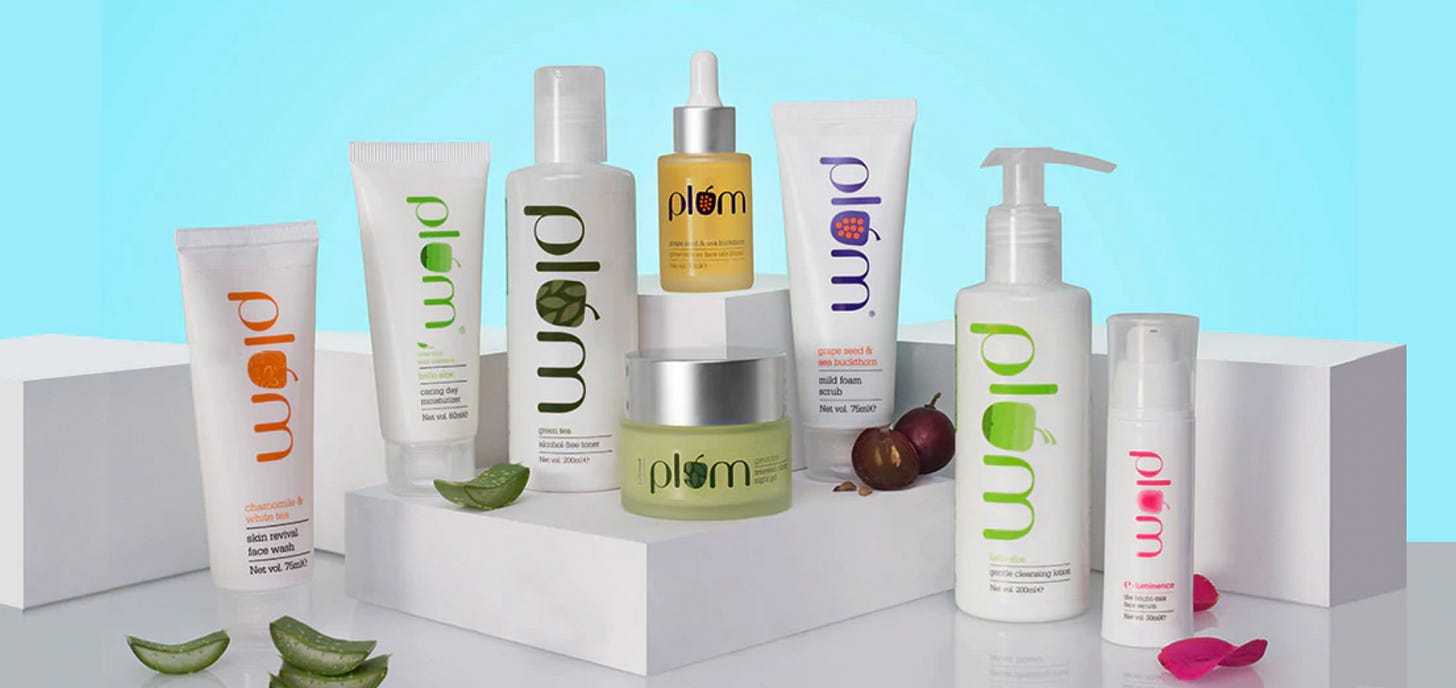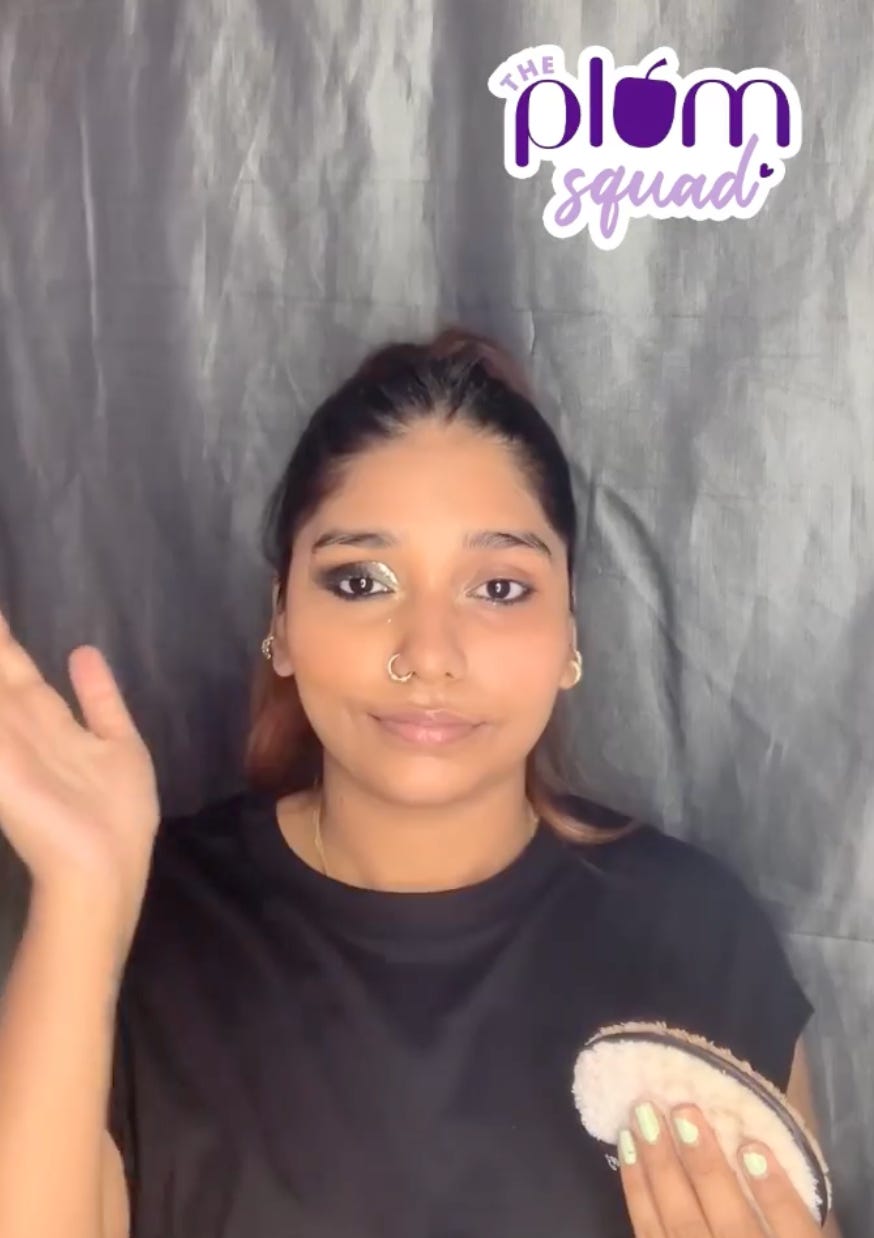Plum Goodness: All about being good
“being good” - to your skin, the environment, and for business
Shankar Prasad built a brand on goodness, a consumer movement inspired by the globe and growing rapidly in India
Shankar was in his final year of Chemical Engineering at IIT Bombay when Hindustan Lever Limited (now called HUL) came down to their campus to woo the final-year students. Seeing the massive and colorful factories in the presentation churning out “Kwality Walls” ice creams excited Shankar about the consumer space. He worked hard to get in and ended up spending the next 8 years there, beginning his tryst with the consumer goods industry. Being a production manager of Pears soap factory, he had developed a deep understanding of skincare products already. He then moved to do an MBA from ISB, followed by stints at McKinsey and Everstone capital where he got a chance to be in the leadership team for Faces cosmetics.
During his multiple visits abroad, Prasad was amazed by the variety of skincare available there. In 2013, he watched mascaras being tested on rabbits in the movie “Ship of Theseus” and felt extremely disturbed. He tried to find a list of cruelty-free beauty brands and came across a list by PETA. The problem with the list however was the same brands that refrained from testing on animals or using harsh chemicals in Europe and US were under no regulation to do so in India.
At the same time, he came across the “1% for the Planet” project in the US, where companies were choosing to donate 1% of their Revenue (and not profits) to the environment. It was started by the founder of a legendary brand Patagonia and several businesses had committed to be a part of this.
Shankar knew that the new consumer cared about a brand beyond just using its products. Plum thus became one of the first 100% vegan brands from India celebrating natural beauty and transparency
What’s in the Name: Plum Goodness
Since the beginning of his entrepreneurial spark in his prev job, Shankar had started to jot down names for his to be future company. He got super excited about “Plum” as its a juicy and wholesome fruit, but also informally used for anything “very desirable”
Why Skincare
Shankar realized in the beauty industry, skincare products enjoyed the most loyalty followed by hair care and cosmetics. During his time at HUL and Faces, he understood there is no concept of “one cream fits all”.
Consumers are taking an effort to find the best products for different needs. He could also see the shift in consumers choosing organic and natural products.
Without taking a day’s break after quitting his previous job, Shankar started working on Plum from a 1 BHK in Thane.
On pricing, he fit the brand in the middle where it was neither a mass brand nor premium-selling, with the face serums selling for ~ INR 400.
“It’s a dumbbell-shaped market with mass-market brands on one end and high-end luxury brands on the other. The space in the middle felt right...it was also the consumer I understood the best. There’s a massive influx into this segment from mass brands and even some reverse traffic from prestige brands."
For the first year, he was a one-man army managing everything independently, from sourcing to sampling to packaging. Now Plum serves over half a million customers a month with over 120 employees
Plum’s unique offering is in its principles and everything the brand stands for
"Skin care should be a joyful, nice treat for your skin to restore and maintain your skin at its natural best. Not a 'treatment' with a 'mission' to make you 3x perfect in 2 weeks, shade card included - did God refer shade cards while making us? "
Apart from the products being good, the brand has multiple honest USPs. They promote diversity and have vowed to not launch any fairness product. They are completely transparent about their ingredients to the extent that they publish both “What’s in and What’s out” of the product. They even unveiled a campaign: “clean.real.good” to help people make informed choices about the products they use.
They truly care about the environmental impact they create. They reward customers for returning empty used bottles, which further are recycled. They are also a part of the 1% for the Planet program, donating 1% of their revenues to environmental causes annually.
Plum Squad: Beyond influencer marketing
Plum has leveraged its limited budget via social media and influencer marketing from the early stages. They now enjoy a following of over 600k on Instagram and over 26k subscribers on Youtube.
“Social media is central to what we do, we obsess over our Instagram comments making sure we respond to everything. That makes the brand come across as approachable. The truth is what the consumer is saying. If I don’t have time to the listen to the truth, then I probably am not doing it right”
Plum educates the consumer by working on different types of content through their channels: mainly Instagram: Educative videos, product trials, blogger collaborations, initiatives, and tutorials.
Plum has also recently launched #PlumSquad, their content creator program, which is essentially a contest for budding creators. It aims to leverage the enormous talent pool and catch them early. Creators are required to make beauty vlogs, and tutorials, capture skin or hair care routines, and tag the brand along with the brand’s sticker on social media.
After some more formalities, five candidates are selected who would be known as Plum Squad. The brand plans to onboard Plum Squad as full-time employees over time.
They have constantly thought out of the box in their approach to marketing.
Bootstrapped for the first 2 years, Plum is now a 145 Cr revenue brand and has raised ~$52 Mn so far
Plum turned profitable within 2 years of launching and remained bootstrapped until 2018. In his experience, not raising money was a conscious choice Shankar made as he wanted to show the revenue was being generated by the product itself.
Only after initial signals of PMF, did they raise money. Since then they have raised three rounds of funding from Unilever Ventures, Faering Capital, and A91 Capital valuing the company at around 1900 crores.
They entered the offline market through MBOs (Multi-brand outlets) in 2017. Speaking to ETRetail, Plum's CEO shared that they have added 50% more customers than they would have by being only just online. They are now starting to launch their own store for customers to get the complete Plum experience.
They also realized that they’re not a brand just for the urban audience as the top 8 cities were only contributing to 30% of their sales.
Sales distribution via channels
In 2019, they added Phy - a men’s grooming brand, becoming a multi-brand company. With strong initial success, they decided to double down. In 2020, they added Plum BodyLovin’. Today the three brands together offer close to 150-odd unique products.
By being strategic about their product, channel, and brands, Plum has managed to have a presence across all online marketplaces and in 750+ assisted outlets and over 10,000 unassisted outlets in 225 towns and cities. They have over half a million customers shopping every month.
The aim is to double down on the offline channel and open 50 more stores in the next two years.
It will be exciting to see their journey as the consciousness of being good is even stronger today compared to when they started.











